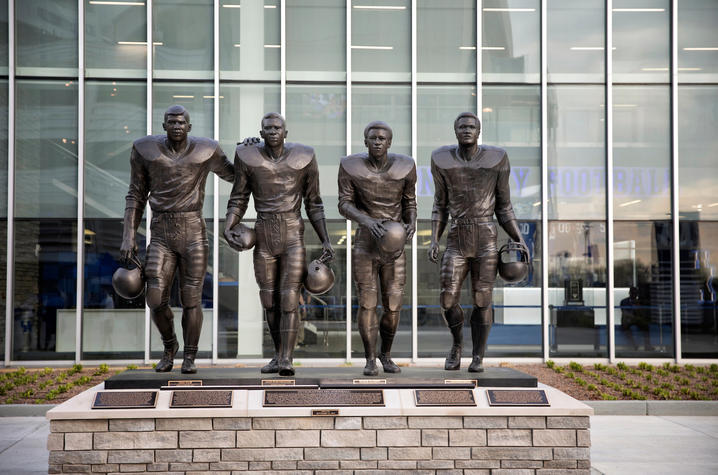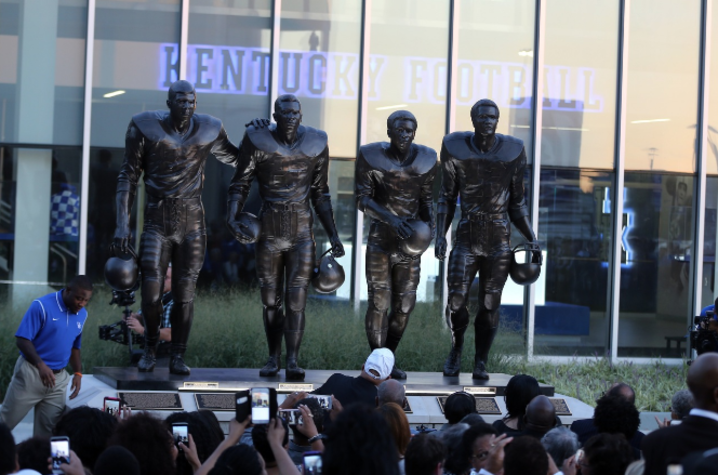Honoring the Wildcats Who Broke Color Barrier in SEC College Football
LEXINGTON, Ky. (Nov. 30, 2017) — University of Kentucky President Eli Capilouto's latest blog:
This weekend at the Southeastern Conference Championship football game in Atlanta, the SEC will recognize a pivotal moment in the life of our conference and our campus.
The SEC family, together, will celebrate Wilbur Hackett, Houston Hogg, Nate Northington, and Greg Page — four Kentucky Wildcats whose legacies shine to this day as beacons of fortitude, conviction, and hope.
They were pioneers against injustice.
They were builders of a better future.
Prior to 1967, not a single African American had played football for an SEC team.
Nate Northington changed that reality — breaking the color barrier at UK and for the SEC — when he stepped on his home field at UK against Ole Miss on Sept. 30, 1967. He became the first black athlete to play in a football game involving two SEC teams.
Greg Page signed on to the team the same year as Northington; Houston Hogg and Wilbur Hackett joined the Wildcat family the following year.
This year marks half a century since that historic game.
It serves not only as a part of our campus history, but as part of our collective consciousness to this day.
Today’s student athletes connect their opportunity to the brave steps these four men took, more than 50 years ago.
This past September, representatives from all 22 athletics teams wore replicas of Nate Northington’s jersey. At the UK vs. Eastern Michigan University football game, he served as honorary team captain, and afterward, Coach Stoops presented him with the game ball.
A year prior, on September 22, 2016, our campus unveiled a statue of the four men between the football training facility and Kroger Field. On that day, I told the UK family that their legacy reminds me of a quote from Henry David Thoreau.
Thoreau said, “It's not what you look at that matters, it's what you see.”
His lesson to us is about the essentiality of context, history, and perspective.
In a sense, too, it is about empathy – the ability and the desire to walk a mile in another’s shoes, to see through someone else’s eyes – to experience what they experience, so that you fulfill your responsibility to one another and the essence of what it means to be human.
Every time we pass by the images of these men from this day forward, let us remember what it must have been like to walk in the shoes of Greg Page, Nate Northington, Wilbur Hackett, and Houston Hogg in a time of hatred and violence.
What awaited them when they crossed the color line? Shunning, shaming, shouting, and shadows of fear. Yet they prevailed, so that those who followed them could more easily prevail.
More than any other setting, college campuses must be spaces where we build upon these lessons of the past.
The intrinsic, ineffable beauty of higher education is that on a college campus we instill in young people the skills to absorb, understand, and navigate fundamental tensions and wrongs like these four brave men did.
We teach them, not to simply look and to see, but to act like these four brave men did.
Daily news reminds us that new and old differences are dividing us; but I remain hopeful, because I see our students are standing on the shoulders of these men. And with us, they are building a more open, inclusive, and accepting community.
We must — in honor of these men — be a place where we continue to respectfully build new bridges — ones that reconcile honest differences of thought, identity, perspective, and ideology.
And on days that we do, we will find common ground, based on the simplest, but most challenging of admonitions to us:
We are to care for each other.
To these men, to their families, and to those who follow in their footsteps: thank you.
This place, this conference, and our shared world is for all people. These four pioneers stand at the entrance to our community as a reminder that the ground on which they stood tall in their time is hallowed. It forever beckons us to stand tall in our time, however strong the wind.






